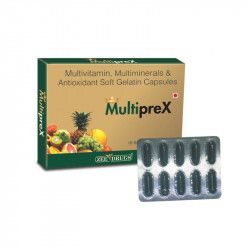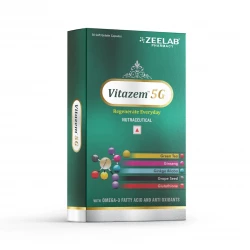Vitamin Deficiencies That Cause Skin Problems (Dermatitis, Rash)


B-Complex with Vitamin C & Zinc (New for...
Each Soft Gelatin Capsule Contains (appr...
Each Soft Gelatin Capsule Contains: Omeg...
Skin is often the first place where vitamin deficiencies show up. A lack of essential nutrients can lead to dermatitis, rashes, dryness, and other visible skin issues. In this blog, we’ll explore which vitamin deficiencies cause skin problems and how you can address them naturally and effectively.
How does a vitamin deficiency cause skin problems like dermatitis and rashes?
Your skin needs vitamins to stay healthy, hydrated, and protected. When your body lacks certain vitamins, it affects skin repair, barrier strength, and moisture retention. This can lead to issues like itchy skin, scaly patches, peeling, or inflammation. Over time, deficiencies make the skin more prone to dermatitis, rashes, and even infections.
Which vitamin B deficiencies lead to skin problems?
Vitamin B deficiencies, especially B2, B3, B5, B6, and B7, are directly linked to skin disorders:
- Vitamin B2 (Riboflavin): Cracked lips, red skin, and a greasy, scaly rash around the nose and mouth.
- Vitamin B3 (Niacin): Leads to pellagra, causing dark, rough patches, especially on sun-exposed areas.
- Vitamin B5 (Pantothenic acid): Dryness, itching, and increased risk of acne.
- Vitamin B6 (Pyridoxine): Red, oily, and inflamed skin, often around the eyes and mouth.
- Vitamin B7 (Biotin): Skin dryness, flaking, and rashes — particularly in people with poor diets or alcohol dependence.
Recommended Products for Skin Support
| Product | Skin Benefits for Rashes & Dry Skin |
|---|---|
| Vitazem Softgel Cap | Supports skin hydration and repair. Helps soothe dryness, flakiness, and minor irritation. Ideal for those with dull or dry skin needing daily nourishment. |
| Zecobax-Z Cap | Promotes healing of rashes and skin inflammation. Useful for treating dry, cracked lips and redness caused by vitamin deficiencies. |
| Multiprex Soft Gelatin Cap | Provides essential nutrients to improve skin texture and moisture. Beneficial for managing chronic dryness, itching, or rough patches. |
Can Vitamin A deficiency lead to rashes and dry skin?
Yes. Vitamin A plays a key role in skin cell turnover and barrier function. A deficiency causes dry, rough, and scaly skin, especially on the arms and thighs. In severe cases, it leads to follicular hyperkeratosis, where hair follicles become clogged with keratin, forming tiny bumps.
Does a lack of Vitamin C affect skin health?
Definitely. Vitamin C is critical for collagen production, which keeps the skin firm and smooth. Deficiency may lead to:
- Fragile skin that bruises easily
- Small red or purple spots on the skin
- Slow healing of rashes and wounds
- Dry, rough patches
Without enough Vitamin C, your skin ages faster and becomes prone to inflammation.
How does Vitamin E deficiency cause skin problems?
Vitamin E protects skin from free radical damage. A deficiency may result in:
- Increased skin sensitivity
- Dryness and flakiness
- Poor wound healing
- Dull skin tone
It’s especially important for people with chronic skin conditions like eczema or psoriasis.
Is Vitamin D linked to skin rashes and dermatitis?
Yes. Vitamin D supports your immune system and helps control skin inflammation. Low levels have been linked to eczema, psoriasis, and atopic dermatitis. People with limited sun exposure or darker skin tones are more likely to develop Vitamin D deficiency, increasing the risk of chronic skin flare-ups.
What are the signs of vitamin-deficiency-related skin issues?
Look for these common symptoms of skin-related vitamin deficiencies:
- Persistent dryness despite using moisturizers
- Peeling or scaling skin
- Frequent acne or breakouts
- Unexplained redness or itching
- Inflamed rashes around the mouth or eyes
- Bumps or thickened skin on arms and thighs
How to prevent vitamin-deficiency-related skin problems?
Simple ways to keep skin healthy:
- Eat a balanced diet: Include fruits, vegetables, whole grains, nuts, and lean protein.
- Supplement when needed: Consider multivitamins if your diet lacks variety.
- Stay hydrated: Water helps vitamin absorption and skin hydration.
- Get sun exposure: 10–15 minutes daily helps maintain Vitamin D levels.
- Limit alcohol and smoking: Both interfere with vitamin absorption.
Frequently Asked Questions
Q. Can vitamin deficiency cause itchy skin?
A. Yes, deficiencies in Vitamin B6, B3, or D can cause itchy, inflamed, or peeling skin.
Q. Which vitamin deficiency causes skin redness?
A. Vitamin B3 (Niacin) deficiency causes pellagra, leading to red, scaly patches.
Q. How fast can vitamin supplements improve skin health?
A. Usually within 2–4 weeks, depending on the severity of the deficiency and dosage.
Q. Does a lack of biotin cause rashes?
A. Yes, biotin deficiency can cause red rashes and dry skin.
Q. What foods help prevent vitamin deficiency skin problems?
A. Include eggs, leafy greens, dairy, citrus fruits, nuts, and fatty fish in your diet.
Conclusion
Vitamin deficiencies are a major but often overlooked cause of dermatitis, rashes, and skin inflammation. By identifying and correcting these gaps early—through diet, supplements, or lifestyle changes—you can restore your skin’s natural glow and strength. Keep your nutritional health in check to prevent chronic skin issues in the long run.











 Added!
Added!